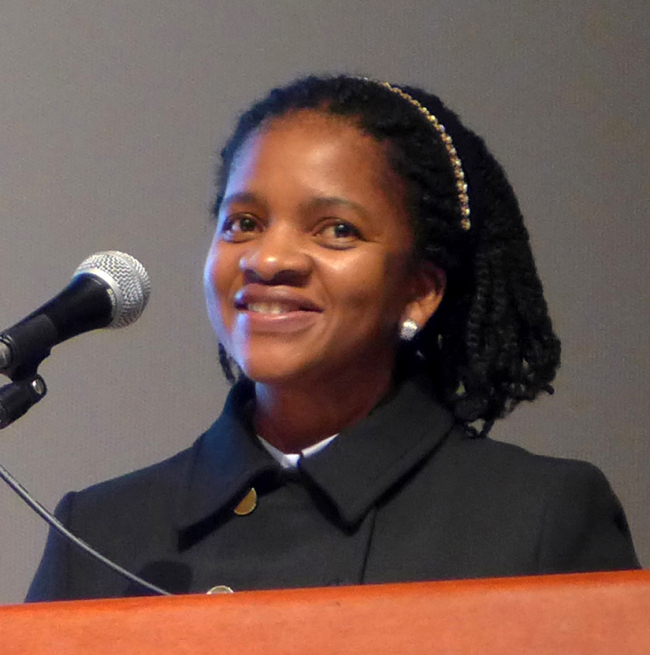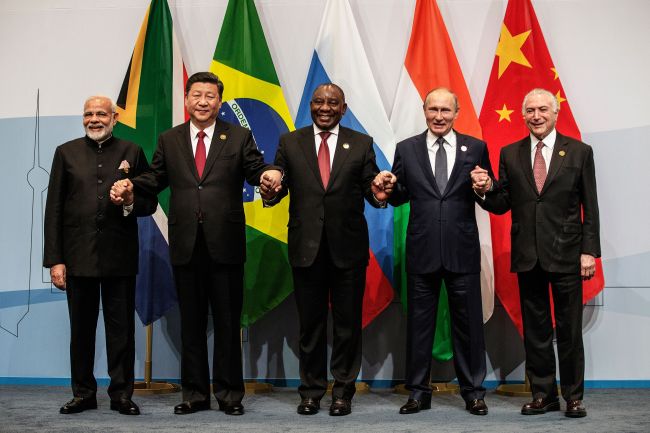Against an onslaught of protectionism, the five major world emerging economies that comprise BRICS are strengthening cooperation in defense of multilateralism and free trade, and further preparing for the “fourth industrial revolution,” according to South Africa’s top envoy to Korea.
South Africa assumed the rotating annual presidency of BRICS -- Brazil, Russia, India, China and South Africa -- on Jan. 1 this year, which lasts through Dec. 31. It hosted the 10th BRICS Summit in Johannesburg from July 25-27, where the five countries’ national leaders gathered.
“This year holds special significance in the BRICS’ historical trajectory, as it concludes the first decade of its summits and coincides with the Nelson Mandela centenary,” Ambassador Nozuko Gloria Bam told The Korea Herald.
The first BRICS summit took place in Yekaterinburg, Russia, on June 16, 2009, between Brazil, Russia, India and China. South Africa joined the institution on Dec. 24, 2010.
 |
South African Ambassador to Korea Nozuko Gloria Bam (Joel Lee/The Korea Herald) |
“South Africa, as part of its BRICS chairship, seeks to strategically align its approach with past chairships, whilst simultaneously retaining its focus on domestic and regional priorities,” she added, noting the event prioritized collaboration for inclusive growth and coping with industrial paradigm changes brought by automation and digitalization.
To combat worldwide isolationist trends started by Washington, and reciprocated by others, the envoy said, “The BRICS countries agreed on the need to safeguard and strengthen multilateralism, and affirmed their commitments to the World Trade Organization to ensure a rules-based, transparent, nondiscriminatory, open and inclusive multilateral trading system.”
Bam said that both BRICS and MIKTA -- an informal alliance of middle powers Mexico, Indonesia, South Korea, Turkey and Australia -- “basically share a similar vision.” She said both institutions were dedicated to fostering innovative and constructive partnerships for “multilateralism, transparency, inclusiveness and compatibility,” as well as creating pragmatic solutions to global challenges.
Both BRICS and MIKTA can buttress their engagement with the African continent, the ambassador highlighted, by partnering with the African Union and working in areas of connectivity, transport, finance and banking, trade and investments and security.
Turning to South Africa’s G-20 membership as the sole African permanent member, the ambassador urged both South Africa and South Korea -- via the Group of 20 -- to enhance collaborations. The two countries, Bam suggested, can help spur economic growth of developing countries in the Global South, narrow opinion gaps on G-20 issues and tangibly implement commitments to global sustainable development, particularly through the G-20 Action Plan on the 2030 Agenda.
 |
(From left to right) India's Prime Minister Narendra Modi, China's President Xi Jinping, South Africa's President Cyril Ramaphosa, Russia's President Vladimir Putin and Brazil's President Michel Temer pose for a group picture during the 10th BRICS (acronym for the grouping of the world's leading emerging economies, namely Brazil, Russia, India, China and South Africa) summit on July 26, 2018 at the Sandton Convention Centre in Johannesburg, South Africa. (AFP/Yonhap) |
The African Union recently signed Continental Free Trade Agreement, which will turn the whole continent into an integrated free trade area after it goes into effect in a few years.
“The African Continental Free Trade Agreement, which provides access to a market of over 1 billion people and a combined gross domestic product of over $3 trillion, aims to spur intra-African trade,” said Bam. “In order to achieve this, massive investments in infrastructure and skills development will be essential, which present great opportunities for countries like the Republic of Korea. Korea can lend its extensive experiences and expertise in infrastructure development, education and skills development.”
The administration of South African President Cyril Ramaphosa welcomed foreign investments in diverse fields, she noted, mentioning renewable energy, recycling, biofuels, water infrastructure, energy, mining and minerals beneficiation, agriculture and agro-processing, aquaculture, tourism, shipbuilding and repairs, business process outsourcing, advanced manufacturing, fuel cell production, aerospace and defense.
“South Africa is determined to derive greater values from its abundant natural resources, and steadily advance up the value chains into knowledge-based industries,” the diplomat said. “We are embracing new technologies and approaches that merge physical, digital and biological worlds. With its world-leading technological know-how, we hope that Korea will play a major role in this process.”
Seoul, through the Korea-Africa Economic Cooperation and the Korea-Africa Industry Cooperation Forum, has participated in Africa’s infrastructural and skills development projects -- two key areas for the continent’s inclusive growth, structural transformation and sustainable development. The country’s development assistance to Africa nearly quadrupled from $107 million in 2008 to $421 million in 2016.
By Joel Lee (
joel@heraldcorp.com)








![[Today’s K-pop] Blackpink’s Jennie, Lisa invited to Coachella as solo acts](http://res.heraldm.com/phpwas/restmb_idxmake.php?idx=644&simg=/content/image/2024/11/21/20241121050099_0.jpg)
